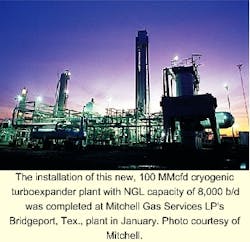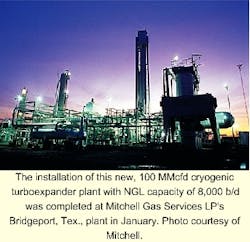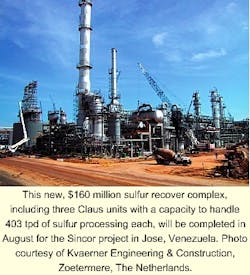Worldwide Construction Update: Gas-to-liquids projects join construction survey
The energy industry of today faces the challenge of finding an efficient production method for environmentally cleaner, yet still economical, transportation fuels.
An opportunity exists for engineering and construction companies to meet that demand by offering new and adaptable process technologies.
Over the past few years, an emerging new technology, gas-to-liquids (GTL), moved from pilot plant status to become commercially viable.
First developed during WWII, GTL technology has historically been too costly to compete with other traditional processing methods. That scenario changed, however, as crude oil and natural gas prices rose amid increasingly stringent worldwide environmental policies.
Additionally, GTL offers a possible solution for the "stranded gas" syndrome by producing cleaner, high quality motor fuels and chemicals that can be transported economically without excessive pipeline construction.
For decades Oil & Gas Journal has reported on new and ongoing downstream construction projects under five categories: refining, petrochemical, gas processing, sulfur, and pipelines. In this issue, we have added a sixth category, gas-to-liquids, to reflect the changing technology of hydrocarbon conversion now commercially available to the industry.
This article describes planned and ongoing engineering and construction projects in the downstream oil and gas industry. Specific details of each project follow in the worldwide construction survey update report.
Gas-to-liquids
In addition to the eight firmly committed GTL plants listed in the following GTL section of the worldwide construction update, several speculative GTL production facilities have been proffered:
- In Alaska, studies have found that the production life of Prudhoe Bay field could be profitably extended through the use of a 50,000-b/d GTL facility.
- In Egypt, talks are under way to consider construction of a 75,000-b/d GTL plant to be associated with LNG production.
- The National Petrochemical Co. of Iran, is contemplating construction of a 70,000 b/d plant to exploit natural gas from South Pars field.
- Rentech Inc., Wyo., is to receive $800,000 from the State of Wyoming Business Council to evaluate two potential GTL projects. The first project entails retrofitting part of an existing methanol plant for production of 2,500-b/d of liquids from gas. The second project involves a 10,000-b/d greenfield GTL plant at the same location.
- Indonesia's state-owned energy company, Pertamina, is said to be in negotiations with both Rentech and Shell International Gas Ltd. concerning planned GTL facilities.
As further information develops, these and other projects may be listed in future issues under the GTL category.
Refining
Downstream processing feasibility studies continue the clean fuels theme as refiners review options for ultra low sulfur fuels.
According to a recent study by CONCAWE, Brussels, a research organization, production of transportation fuels with a 10 ppm maximum sulfur specification is "feasible with already existing or emerging refinery technologies." It seems likely that "virtually every refinery would require new processing facilities."
The report goes on to state that "individual refiner's strategies could lead to under-investment and supply-demand imbalances," a belief mirrored by the US National Petrochemical & Refiners Association.
To avoid such pitfalls, many organizations have begun companywide strategic feasibility studies to plan how much, or how little, processing reconfiguration will be needed in the next few years in order to meet US clean fuel specifications of 15 ppm by June 2006.
Other refiners plan revamps on existing process units in order to reduce air emissions that cause harmful air pollution.
Equiva Services LLC has contracted Bechtel Group Inc. of the US to produce feasibility studies regarding numerous new or expanded hydrocracking and hydrotreating units in its Los Angeles, Calif.; Puget Sound, Wash.; Port Arthur, Tex.; Deer Park, Tex.; Norco, La.; and Convent, La., refineries.
Parsons Energy & Chemicals Group Inc. has begun an $800 million refinery expansion project for the National Oil Distribution Co. (NODCO), Qatar. As part of the project, Parsons plans to evaluate the crude distillation, hydrotreating, reforming, and isomerization units for facility-wide optimum performance. NODCO processes Dukhan and North field crudes and condensate.
To assist US refiners, Lyondell Chemical Co., Houston, partnered with Kvaerner E&C Group, London, will offer technology to retrofit existing MTBE processes into flexible iso-octene and iso-octane processes. The resulting high-octane, low-RVP, low-oxygenate product can be used as a motor fuel blending component.
Amakpe International Refineries Ltd., Nigeria, has contracted Ventech Engineers Inc., Pasadena, Tex., to design and construct Nigeria's first privately financed oil refinery to be located at Eket in Akwa Ibom State. The 12,000 b/d refinery will be constructed in preassembled modules and shipped to Nigeria to process Qua Iboe crude oil. The plant is scheduled to start up in December.
Petrochemicals
Petrochemical plant construction continues in China with BP's 350,000 tonnes/year (tpy) purified terephthalic acid (PTA) plant. Located in Zhuhai, in China's Guandong province, the PTA plant is BP's largest investment in China to date, and will be operated by Amoco Zhuhai Chemical Co., China, after commissioning in December 2002.
Jam Petrochemical Co., Iran, awarded Technip Group of Paris, the contract to build a 1,400,000 tpy ethylene plant at Bandar Assaluyeh. Technip claims the engineering design will create the largest steam cracker ever built, capable of using both gas and liquid feedstocks for ethylene and propylene production. Technip will provide basic and detailed engineering, licensing, equipment and materials, and construction and commissioning supervision.
Gas processing
Sakhalin Energy Investments Co. Ltd., a joint venture company established by Shell, Marathon-USX Group, Mitsui Corp., and Mitsubishi Corp., will build the first world-scale, 9 million-ton LNG plant in the Russian Federation. The greenfield contract was awarded to a consortium headed by Fluor Daniel, a unit of Fluor Corp., Aliso Viejo, Calif.; Chiyoda Corp., Japan; and OAO Nipigaspererabotka, Russia. The plant is scheduled for completion in August.
Japan Petroleum Exploration Co. Ltd., (Japex) has let contract to Nippon Steel Corp., Japan, to build the country's first LNG plant. The 150 tpd plant, located near the Yufutsu gas field, will deliver LNG to remote Asahikawa Gas Co., a local distributor in Hokkaido, via an existing railway.
SembCorp Utilities, Singapore, will build the first NGL plant in Singapore at a cost of $86 million if feasibility studies show sufficient demand. If approved, the project should be completed within 2 years.
Mitchell Gas Services LP, a unit of Mitchell Energy & Development Corp., The Woodlands, Tex., is planning a major 2-year midstream expansion to handle rapidly growing gas production from its Newark East field in North Texas. At a cost of $130 million, Mitchell will increase processing capacity at its Bridgeport, Tex., natural gas processing plant to 430 MMcfd and production of NGL to 37,000 b/d with the addition of two cryogenic turboexpanders, 35,000 hp of compression, and 170 miles of gathering system. Earlier this year, Mitchell completed a 100 MMcf/d and 8,000 b/d expansion at its Bridgeport plant.
Sulfur
In Canada, Suncor Energy Inc., Fort McMurray, Alta., has licensed Bechtel Group Inc.'s technology for its new 500 tpd Claus tail gas treating unit and construction, which is expected to be completed during the second quarter of this year. Also, Canadian company Consumers Cooperative Refineries Ltd. is planning 150 tpd expansion of its Claus Sulfreen unit which should be completed in September 2002.
National Iranian Oil Co. (NIOC) is planning four new Claus SRUs for a total 2,050 tpd additional capacity. NIOC currently recovers 78 tpd of sulfur from refinery gas and 1,700 tpd from natural gas.
In Jose, Venezuela, Sincor, a strategic alliance between TotalFinaElf SA, Petroleos de Venezuela SA, and Statoil AS, let a $160 million contract to Kvaerner for the expansion of three Claus units. The completed 403 tpd capacity sulfur complex is needed to support the upgrade of extra heavy crude produced from the Orinoco Belt. The project is slated for completion in August.
In the US, Marathon Ashland Petroleum LLC, is planning a new, 225 tpd Claus/Scott unit to recover sulfur from refinery gases. The project is currently under construction and should be completed in June.
Pipeline
Talk continues regarding competition between the proposed Alaskan Highway pipeline and the Mackenzie Delta pipeline. The goal, to transport Prudhoe Bay gas to the Lower 48 markets, could be achieved by either pipeline.
The Alaskan Highway pipeline project has the advantage of completed regulatory approval, environmental review, and established technology. The Mackenzie Delta pipeline is shorter than the Alaskan Highway pipeline's proposed 1,800-mile route, but 400 miles of that project's pipeline would be subsea at untested pressure across the Beaufort Sea. GTL and LNG projects are other possible avenues of transportation for the gas.
Another major project, the Canadian Corridor Pipeline, is currently under construction and will link the Muskeg River Mine near Fort McMurray, Alta., to the upgrading facility at Shell Canada Ltd.'s Scotford refinery near Fort Saskatchewan, Alta. The 280-mile, 24-in. diameter pipeline, designed to move 215,000 b/d of diluted bitumen, is scheduled to begin operations in 2002. Trans Mountain Pipe Line Co. Ltd. is the constructor and operator.
Guardian Pipeline recently won Federal Energy Regulatory Commission approval. The 141-mile natural gas pipeline between Joliet, Ill., and Ixonia, Wis., is under advanced development, said CMS Energy Corp. The 36-in. diameter pipe will handle 750 MMcfd and is scheduled for completion by November 2002. Willbros Group Inc. is the contractor.


